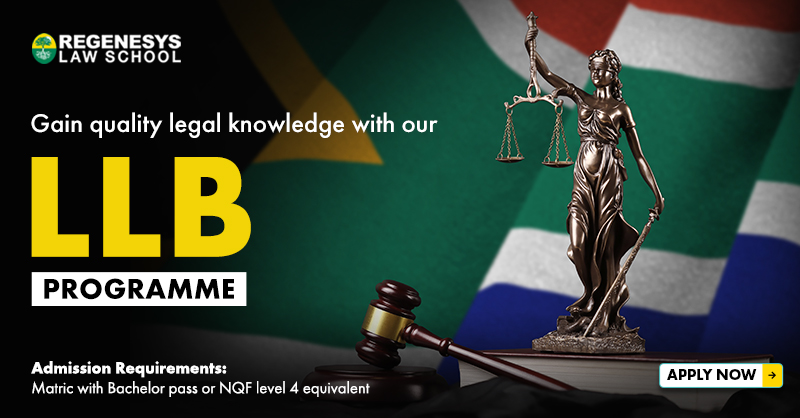For many students, the idea of becoming a lawyer is exciting, but there is often confusion about whether mathematics is required to study law in South Africa. The truth is, maths is not a strict requirement, and success in law depends more on language, reasoning, and analytical abilities. Universities are more concerned about your ability to read, write, and argue logically than your ability to solve equations.
This makes law a career option for a wide range of students, including those who focused on humanities or social sciences in school. It also means that the door to legal education is more open than many learners realise.
In this article, we explore law in South Africa, whether maths is really needed, the minimum requirements to study law, key skills for success, labour law studies, career areas that involve numbers, and why Regenesys Law School is an excellent choice for your LLB journey.
Table of Contents
- Understanding Law in South Africa
- Do You Really Need Maths for Law in South Africa?
- Minimum Requirements to Study Law in South Africa
- Key Skills Needed to Study Law
- Is It Difficult to Study Law in South Africa?
- Why English and Critical Thinking Matter More?
- Career Areas in Law That Use Numbers
- Why Regenesys is the Right Choice for Law Studies?
- Conclusion
- Law in South Africa – FAQ
Also read, Are you a lawyer after an LLB?
Understanding Law in South Africa
Law in South Africa is deeply rooted in its Constitution, which is considered the supreme law of the land. The system combines modern democratic principles. Together, these influences create a unique and inclusive framework that is highly respected internationally.
Studying law in South Africa means more than just understanding statutes; it involves learning how laws are interpreted, applied, and evolved in response to social, political, and economic challenges. The legal system also plays a vital role in safeguarding human rights, addressing labour issues, promoting justice, and ensuring accountability in both private and public sectors.

Do You Really Need Maths for Law in South Africa?
Unlike degrees in finance, engineering, or science, law focuses more on reading, writing, analysis, and logical reasoning.
That said, basic numeracy skills are still functional. For example, lawyers often deal with contracts, financial settlements, or damage claims where calculations may be required. However, this level of maths is manageable without advanced mathematics.
While the law in South Africa never focuses on algebra or calculus, a basic level of mathematical competence is necessary. Most universities, including Regenesys, expect students to demonstrate competence in Mathematics at NQF Level 4 as part of the admission process. Mathematics at this level supports logical reasoning, problem-solving, and analytical thinking abilities that are invaluable in legal studies. In short, while you don’t need to be a mathematician to pursue law, having a solid foundation in basic maths will help you navigate certain aspects of your studies and professional practice with confidence.
Read the article, What Subjects Are Needed to Become a Lawyer in South Africa?
Minimum Requirements to Study Law in South Africa
Other academic standards aspiring law students must meet. These requirements vary slightly between universities but generally include matric passes, language proficiency, and APS scores.
Here are the standard minimum requirements to study law in South Africa:
- A Bachelor’s pass or an equivalent qualification.
- English proficiency: at least 50% for English as a first language, or 60% for English as a second language.
- A minimum APS score of around 26 points is required.
- Some universities may request competence in subjects such as history or business studies, but these are not compulsory.
- For international students, an equivalent qualification such as A Levels is often accepted.
In short, the focus is on language, reasoning, and comprehension skills, not advanced maths.
Also read, Bachelor of Law Entry Requirements in South Africa: Your Guide for Starting a Legal Career
Key Skills Needed to Study Law
Beyond academic requirements, succeeding law in South Africa requires specific personal and intellectual abilities. Legal studies are rigorous, demanding precision, critical thought, and the ability to interpret complex material.
The following are essential skills for law students:
- Analytical Thinking – Ability to break down cases, arguments, and statutes into logical parts.
- Research Skills – Competence in finding, interpreting, and applying legal sources.
- Communication – Strong writing and oral skills to argue cases effectively.
- Ethical Judgment – Awareness of justice, fairness, and moral responsibility in practice.
- Problem-Solving – Practical solutions for legal disputes and negotiations.
These skills and knowledge are essential when pursuing a profession in this field.
Also read, LLB Career Opportunities in South Africa: Choosing the Right Path for You

Is It Difficult to Study Law in South Africa?
Studying law in South Africa is challenging, but it is also one of the most rewarding academic and professional journeys. The difficulty lies in the amount of reading, research, and critical thinking required. Law students are expected to interpret complex statutes, analyse case law, and apply legal principles to real-life scenarios.
However, the challenge is what makes the qualification so valuable. Students gain not only knowledge of the legal system but also transferable skills, such as problem-solving, communication, and ethical reasoning. While the workload can feel overwhelming at times, support is available through lecturers, study groups, and online resources. With dedication and a genuine interest in justice and society, the difficulty becomes an opportunity for growth. In the end, the effort pays off, as graduates are well-prepared for diverse and impactful careers.
Also read, Studying Law Online in South Africa: Everything You Need to Know
Why English and Critical Thinking Matter More?
While basic mathematics forms part of the entry requirements, the most essential skill for studying law in South Africa is proficiency in English. Since the majority of teaching, assessments, and legal practice happen in English, universities require applicants to meet minimum thresholds: 50% in English as a first language or 60% in English as a second language. These standards ensure students can read and interpret complex texts, draft arguments, and communicate effectively.
Critical thinking is also a significant requirement. Law students are constantly asked to analyse statutes, evaluate arguments, and form reasoned conclusions. These skills cannot be developed without a strong grasp of language. While numbers play a role in certain branches of law, words are the proper tools of a lawyer.
Thus, if you are preparing for an LLB degree, focus on building your English, reasoning, and communication skills as these will carry you much further than advanced mathematics.
Career Areas in Law That Use Numbers
Labour law is a significant area of specialisation within law in South Africa, given the country’s complex employment environment and strong emphasis on workers’ rights.
Studying labour law equips students to understand the relationships between employers, employees, and trade unions. It also covers workplace regulations, dispute resolution, and employment contracts.
Students who pursue labour law studies often do so within a broader Bachelor of Laws (LLB) degree, where it is offered as a module or area of specialisation. Some universities also provide postgraduate diplomas or master’s programmes focused specifically on labour relations and employment law.
By studying labour law, graduates gain valuable expertise in areas such as collective bargaining, workplace contracts, and dismissal procedures, which opens up career opportunities in corporate HR departments, trade unions, government, or private practice.
Although law is language-driven mainly, there are specific career paths within law in South Africa that demand greater comfort with numbers. Having basic mathematical skills, as required by Regenesys, can be a significant advantage in these areas.
These are the key career areas that use numbers to pursue a law career:
- Commercial Law – Involves contracts, company valuations, and financial negotiations.
- Tax Law – Requires interpreting tax codes, calculating liabilities, and analysing financial statements.
- Property Law – Often involves numbers for transactions, property valuations, and mortgages.
- Labour Law – While focused on workers’ rights, cases involving wage disputes and compensation may require calculations.
In each of these fields, lawyers are not expected to perform advanced accounting, but they must be numerate enough to understand figures, check calculations, and communicate effectively with financial experts. This is why Regenesys includes competence in maths and computer skills as part of its LLB entry requirements.
Why Regenesys is the Right Choice for Law Studies?
Choosing the right law school is one of the most important decisions for any aspiring legal professional. Regenesys Bachelor of Laws (LLB) stands out because of its commitment to combining academic excellence with practical training. Unlike many traditional programmes that focus purely on theory, Regenesys ensures students engage with real-world case studies, legal simulations, and industry-relevant research. This approach equips graduates not only with knowledge but also with practical skills that employers value.
Another strength of Regenesys is its flexibility and accessibility. With both online and contact study modes, learners can balance their studies with work or personal commitments. The School also prioritises affordability while maintaining world-class standards, making legal education accessible to a wider audience. Graduates of Regenesys emerge with a strong ethical foundation, analytical skills, and the confidence to pursue careers in government, corporate law, labour relations, or private practice. For those who want a future-proof qualification with real impact, Regenesys is the right choice.

Conclusion
While advanced mathematics is not required, basic competence in maths at NQF Level 4 is part of the entry requirements at Regenesys. What matters most are strong English skills, critical reasoning, and a willingness to engage with complex ideas.
By studying law, you open doors to diverse careers from labour law and commercial law to public service and legal research. With Regenesys Education, students gain both theoretical knowledge and practical experience, ensuring they are well-prepared for the realities of legal practice. If you’re serious about a law in your career, Regenesys offers the flexibility, expertise, and credibility to help you succeed.
Law in South Africa – FAQ
Do you need maths to study law in South Africa?
No, advanced maths is not required. However, basic competence in mathematics at NQF Level 4 is necessary for admission at Regenesys.
What are the minimum requirements to study law in South Africa?
Generally, a matric with a Bachelor pass, strong English results, and an APS of about 26 are required.
Can I study law without English as a first language?
Yes. If English is your second language, most universities, including Regenesys, require a minimum of 60% to ensure you can manage the demands of legal studies.
What careers can I pursue with an LLB degree in South Africa?
Graduates can work as legal advisers, public prosecutors, litigation specialists, legal researchers, law professors, or pursue further qualifications to become attorneys or advocates.
Why should I choose Regenesys for my LLB?
Regenesys offers a flexible, modern, and practice-oriented LLB programme. With online and contact study options, expert faculty, and strong ethical training, it prepares students for real-world legal careers.







